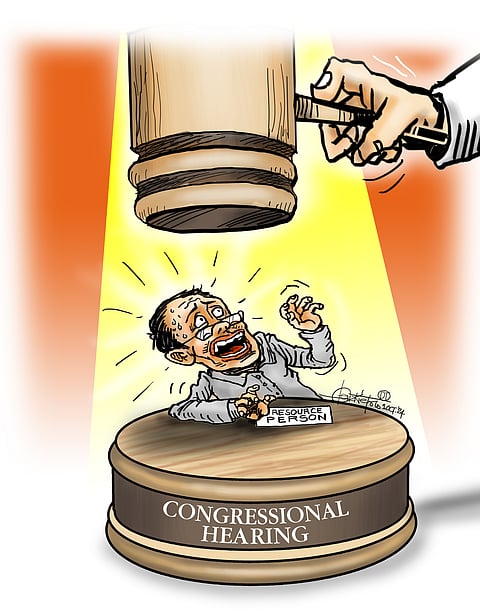
- NEWS
- the EDIT
- COMMENTARY
- BUSINESS
- LIFE
- SHOW
- ACTION
- GLOBAL GOALS
- SNAPS
- DYARYO TIRADA
- MORE

Many members of the House of Representatives have earned a reputation — or the ignominy — of being hard, even brutish, when dealing with resource persons invited to congressional hearings in aid of legislation. Take, for example, Rep. Romeo Acop, a retired police investigator who brings a tone of inquisitorial rigor to his questioning, probing deep into the heart of matters.
Then there are Reps. Benny Abante and Dan Fernandez who, depending on the issue, can be suave and composed, or as tough as a judge, jury and executioner rolled into one. These lawmakers have been known to give resource persons no quarter, often leaving their subjects squirming under intense scrutiny.
In both the House and Senate, many lawmakers have shown little remorse citing witnesses and resource persons in contempt for refusing to answer their questions or, worse, for allegedly lying. In several instances, they had ordered their detention until they provided the information sought.
This has often drawn public ire, with accusations of abuse of power and infringement on basic rights, including the right against self-incrimination. These actions, some claim, border on using congressional hearings for political grandstanding rather than genuine legislative work.
One recent example is the tense standoff between Vice President Sara Duterte and the House of Representatives led by Speaker Martin Romualdez. Duterte, after facing heated questioning during the House Appropriations Committee hearings on her office’s budget for 2025, stonewalled when pressed about her utilization of confidential funds in past years.
Instead of being transparent, Duterte clammed up, leaving the lawmakers visibly frustrated. Then, in an audacious and some say ill-advised move, she declined to attend any further House hearings, much to the lawmakers’ chagrin, only to announce that she would attend the Senate’s counterpart hearing.
One cannot help — but wonder: what if Duterte had simply begged off from both the House and Senate hearings from the very start? After all, the President himself doesn’t attend hearings on the proposed budget for his office. Had she followed that precedent, it is likely that Congress would have shown the same respect. But by engaging in selective attendance, she not only earned the ire of House members but also exposed the tension between the legislative and executive branches.
The House’s reaction, however, should not have been entirely surprising. Lawmakers, whether dealing with Duterte or any other high-ranking official, view these hearings as a critical tool for transparency and accountability. They provide a platform for questioning how public funds are used and whether government offices are adhering to the principles of good governance. And while they can sometimes devolve into political theater, these hearings serve a valid purpose in shaping legislation that impacts the nation.
These hearings can also take bizarre twists and turns and even solve whodunits. Nowhere was this more evident than in the recent case of the Philippine Military Academy (PMA) Matikas Class of 1983 and their plea for justice for their slain classmate, Wesley Barayuga. The House Quad Committee recently elicited a self-confession that has shocked the country.
During its investigation into Barayuga’s assassination, former narcotics agent Lt. Col. Santie Mendoza confessed that he was ordered by former PCSO General Manager Royina Garma and National Police Commissioner Edilberto Leonardo to have Barayuga killed in exchange for P300,000.
This revelation has finally brought hope for justice to Barayuga’s family and classmates, who have been waiting four long years for answers. The PMA Matikas Class extended their heartfelt gratitude to Speaker Romualdez and the House for its relentless efforts to uncover the truth. Their statement, poignant and clear, underscored how the committee’s incisive questioning had brought clarity to Barayuga’s death, naming those allegedly responsible and giving his family some semblance of closure.
The case of Barayuga’s assassination is a reminder that while congressional hearings often appear to be performative or politically charged, they are sometimes the only mechanism capable of uncovering the truth. In this instance, what could have easily been dismissed as political theater instead led to a breakthrough in a murder investigation — a breakthrough that might never have occurred without the House’s relentless questioning.
Of course, there will always be detractors. Critics will argue that these hearings often trample on the rights of individuals and that they have become platforms for politicians to make a spectacle of themselves rather than engage in genuine public service. There may be some truth to this.
In the end, it is a delicate balance. Lawmakers must be mindful of the fine line between genuine accountability and overreach. And while we should remain critical of abuses of power, we must also recognize when these efforts work in the service of the greater good.
